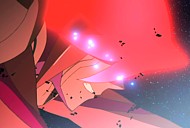
Diebuster (AKA Gunbuster 2)
Gainax has always made pretty pictures. Sometimes the studio has combined them with passionate, intelligent, and controversial content. Their oeuvre includes deep programs like Wings of Honneamise and Neon Genesis Evangelion. Some of their other creations like Gunbuster and FLCL aren't quite as thoughtful but are still a lot of fun. You can fault them for their prediliction for unnecessary fan service (is there any other kind?), but they are one of the best animation houses in Japan, period.
When I heard that there was going to be a sequel to their early hit Gunbuster, I was excited. That seminal series started out weakly but over the course of its six episodes grew to be a visual and emotional powerhouse. I delayed it a long time because of Bandai Visual's ridiculous pricing scheme for it. Now easily available for rent through Netflix and other usual suspects, I checked it out. And I found it...decent. I know that nostalgia may be coloring my views of the original, but this one just doesn't have the same spark. Nor is it much of a sequel. That said, it is a wonderfully rendered show whose sheer beauty kept many of my complaints at bay during its running time.
As Diebuster begins, Nono is leaving home. A young girl without a past she can remember, she longs to be a space pilot like her idol Nonoriri. Instead, she winds up working at a junky diner where she finds herself in debt for all the plates she breaks. Harassed by some space pilots, Nono is rescued by the tomboyish Lal'C, who she quickly decides will be her best friend. As a part of an elite group of people known as Topless, Lal'C has special abilities to pilot a Buster machine with which she fights alien invaders, and it becomes Nono's dream to be Topless too. (Hardy har har.) When an alien invader hurls itself towards the planet, Nono's latent abilities (and identity) are revealed. While her unique nature (that I shan't spoil here) makes it virtually impossible for her to pilot a Buster, she nevertheless finds herself a part of the Topless team. And just in time, too, for it turns out that all these space creatures they've been fighting for years are window dressing in comparison to the real monsters waiting to be awakened. Lal'C is not looking for a BFF, but she's going to need Nono by her side when the universe starts breaking loose.
When I watched Diebuster, I realized how seldom I am awestruck by animation any more. Modern televised anime may look prettier than its earlier incarnations, with a better palate of colors and certain beauty afforded by the aid of computers, but there's little that amazes. While Diebuster may be out in the cold reaches of space, the technological design and attention to detail is a sight to behold. I'm not a huge fan of the new character designs; Gunbuster did amazing things with the masterful Haruhiko Mikimoto's concepts, and in comparison, the new FLCL-inspired look is dull. That said, watching it all unfold is a treat. I also really enjoyed the score, a bombastic, driven work that makes you know that this is big ol' space opera turned up to 11.
Science fiction is what got me into anime, and there's not enough good sci-fi being made, so I'll take what Diebuster gives me. Intense space battles, great-looking mecha...I eat it all up. The popcorn side of me loved that this was the anime equivalent of Independence Day or Transformers, a rock-'em sock-'em ride that's not meant to mean something so much as it is to entertain. On this front, I give it unreserved applause. I'm not going to go on and on about it other than to say that if you like big robots with guns and massive battles and light flashes going everywhere, find this now. You won't be disappointed.
However, there are three things wrong with Diebuster. First is that it makes little sense. You can follow the storyline; it's not incoherent. But in terms of knowing why things are the way they are, Diebuster shows you first, then tells you later. For example, without some key information revealed in the second episode, the ending of the first episode feels incredibly silly, if not stupid. Another weird thing is Nono's idolization of this Nonoriri person, whose identity we only know at the tail end. By the time the end credit roll, there aren't many unresolved story arcs. But does it all really fit together in a meaningful way? I'd say no. And while it might technically be a sequel to Gunbuster, only its biggest fans are going to catch some of the subtle tie-ins.
More important, though, is that the relationships don't register at an emotional level. I knew the story wanted me to buy the awkward friendship between Nono and Lal'C and her growing closeness to the Topless team that was once very aloof. The script said it was so. I just didn't buy it. The human touch was absent, and so when it is supposed to matter in the sixth episode, I was like, "Really?" I'm a sap; I watch romantic comedies with Hugh Grant and Drew Barrymore because I want to believe in love even with the crapola storylines and the "meet cute" and everything else. You want me to be moved by an abiding friendship put through the ringer? Man, I get that. But sell me on it! And Diebuster didn't. Nor did it ever make me care for the other Buster pilots, so when they started getting picked off, did I care? Um, no. That made the finale a wash for me.
My last gripe is a personal complaint many of my viewers won't share, and that's to do with the fan service. Many shows have more than Diebuster, admittedly. In Diebuster, though, the moments of nudity feel intentionally ridiculous and over-the-top. Uncomfortable? Yes, a bit. They weren't organic in the slightest. But given Gainax's past -- and the fact that the elite squad is named "Topless," in English, in a Japanese show -- I can't complain that I didn't know that I was in for this.
I want to rank Diebuster higher than I am going to. It's fun to watch. It's a feat of animation at times. But for a show that looked as good as it does, I'm having a hard time remembering its plot just a few days later. It didn't resonate with me like Gunbuster did. While it does improve as the series goes on, it comes nowhere close to the conceptual intelligence or emotional heft of its predecessor. As a stand-alone anime, sure, it's not bad, but it doesn't aim for the top nearly well enough.
Diebuster (AKA Gunbuster 2) -- nudity and fan-service, mild profanity, violence -- B

